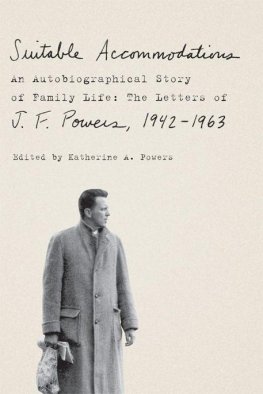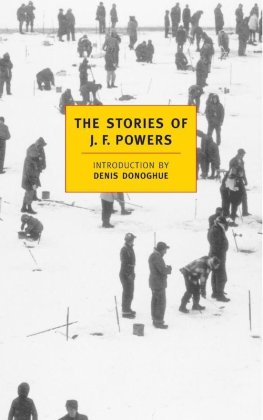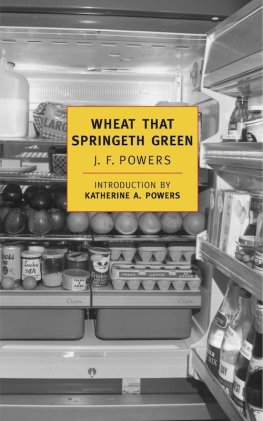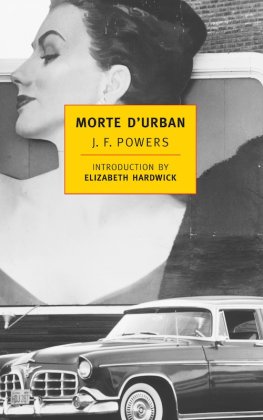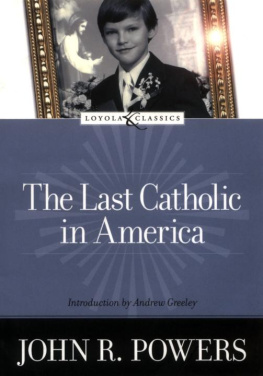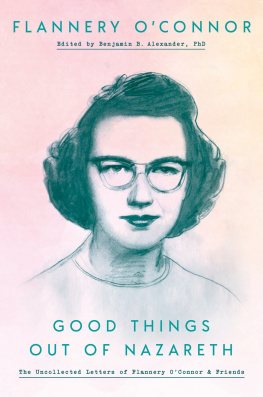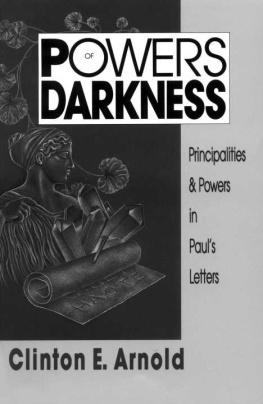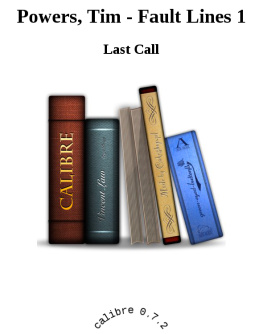J.F. Powers
Suitable Accommodations: An Autobiographical Story of Family Life: The Letters of J. F. Powers, 1942-1963
To the memory of my sister Mary Farl Powers and my parents
There was an extraordinary mixture of comedy and tragedy in the situation which is here described, and those who are affected by the pathos of it will not need to have it explained to them that the comedy was superficial and the tragedy essential.
Edmund Gosse, introduction to Father and Son
He that hath wife and children hath given hostages to fortune; for they are impediments to great enterprises, either of virtue or mischief.
Francis Bacon
We are pilgrims only, but since the trips quite long, I tend to look around for suitable accommodations.
J. F. Powers, June 3, 1952
Introduction by Katherine A. Powers

Jim and George Garrelts, 1952
Well before the publication of his first novel, Morte DUrban, in 1962, my father, J. F. Powers, henceforth called Jim, planned to write a novel about family life, an intention that persisted for the rest of his life. It was to be, in some fashion, the story of a writer, an artist, with bright prospects, a taste for the good things in life, and an expectation of camaraderie as he made his way in the world. The man falls in love, gets married, has numerous children but has neither money nor home. He finds no pleasant ease and little of the fellowship of like minds he associated with the literary life he had thought was to be his own. The novel would be called Flesh, a word infused with Jansenist distaste, conveying the bleak comedy and terrible bathos of high aesthetic and spiritual aspiration in hopeless contest with human needs and material necessity.
The proposed book took on other names and fused itself with other themes, most notably with the triumph of consumerism in American life: at times it was The Sack Race; at other times, NAB (Nationally Advertised Brands); and, at yet others, Nobody Home. (The last two also served as provisional titles for another unwritten novel, while The Sack Race became the working title for Jims second and final novel, Wheat That Springeth Green, the image serving admirably for both priests and artists.) In one version of the novel drawn very much from life the narrator, a one-book author who is unable to complete a second novel, has been reduced to living with his populous family in his wifes parents middle-American home.
In any event, the family-life novel never got beyond a few notes, jottings, and false starts. Or so it seemed. Jim was, in fact, not only living it but creating and embellishing it in his correspondence, a body of writing whose size and extent go some way toward explaining the small number of his published books.
The letters that make up this story begin with Jim at age twenty-five and the acceptance for publication of his first short story. They then leap forward to letters from prison and on through those recording high hopes, great promise, and a passionate courtship of and marriage to Betty Wahl. Then comes the black comedy of children, five all told, great poverty, bad luck, and balked creativity. Central to this progression is the matter of where and how to live. Jims married life was dominated by the search for suitable accommodations, for a house that would reflect and foster the high calling of the artist. In the course of their married life, which lasted from 1946 until Bettys death in 1988, the couple moved more than twenty times. This included eight times across the Atlantic: four tenures in Ireland and four returns. I vacillate, Jim wrote to a friend, between wishing I had the wings of an angel one whose wings would know where to take him, however and a large brick house in which to hide myself, with books, music, etc.
Jim James Farl Powers was born in Jacksonville, Illinois, on July 8, 1917. His father, James (18831985), was the son of a man, also called James, who came from county Waterford, Ireland, and worked at a gasworks. He died when James, his son, was around seventeen. This James, which is to say Jims father, aspired to be a pianist, was called a prodigy, and was offered a chance to study in Paris or so Jim maintained. Instead, the young man sacrificed that future in order to provide for his sisters and widowed mother. She was the woman who ruined my fathers life, I hold, Jim wrote in describing his background to Betty, his wife-to-be, two weeks after they had met. It is a glimpse of his view of family obligations that should, perhaps, have given her pause. Stuck in southern Illinois, James ran dance bands, played sheet music for customers in a music shop, and operated an unsuccessful butter-and-egg store before finally becoming a middle manager for Swift and Company. He was laid off during the Depression and was out of work for some years until he was hired back by Swift as an accountant, a lower position. Jim considered both jobs demeaning and sad, all the more so as his father did not see them that way and was a conscientious worker and devoted provider.
Jims mother, Zella (18921973), was the daughter of Matilda ne Zilberstorff by her first husband, Farl Routzong, a farmer, painter and grainer, balloonist, and semiprofessional baseball player who died of TB before he was thirty. Matildas second husband (of at least three) was a rich and kindly farmer who put Zella through college, a rare thing for a woman in the early part of the twentieth century.
Jim grew up in Illinois, in Rockford and, later, Quincy, where he made lifelong friends, among them George Garrelts, later a priest. Gregarious, ambitious, high-handed, and adept in Church politics, Garrelts was Jims closest friend for years and exercised a formidable influence over him. Both eventually attended high school at the Franciscan-run Quincy College Academy. After graduating in 1935, Jim moved to Chicago, taking various jobs, his first at Marshall Fields selling books. Later he found a position as chauffeur or, as he put it, driving a big Packard for a bastard through the South and Southwest.
Eventually, he found work on the WPA Illinois Historical Records Survey in Chicago, where he met a number of writers from the WPAs Federal Writers Project, among them Nelson Algren, Richard Wright, Jack Conroy, and Arna Bontemps. After that he sold books again, this time at Brentanos, from which job he was fired for refusing to buy war bonds. He spent a couple of semesters at Northwestern, where he took at least one writing seminar with Bergen Evans (afterward best known as the master of ceremonies on the TV quiz show The $64,000 Question). Meanwhile, Jim began to write stories, had a couple of love affairs, became a committed pacifist, and contributed pieces to Dorothy Days newspaper, The Catholic Worker.
In the early 1940s, Jim became acquainted with Father Harvey Egan, a fellow assistant of George Garreltss at St. Olafs in Minneapolis. Within a few years, Egan had taken on the role of Jims literary patron, bailing him out with loans and gifts over the decades. Possessed of a humorous, sardonic streak, Egan was also one of Jims most important correspondents and a thoroughly appreciative foil for his dry wit and self-deprecating fancy.
When Jim met him, Egan was a rigorous Detacher, as, indeed, was Garrelts at the time. Detachment is possibly the most forgotten strain in the nearly forgotten American Catholic countercultural religious and social ferment of the mid-twentieth century. (This also included Catholic Action, the Catholic Worker movement, the Catholic rural life movement, the liturgical movement, the Christian Family Movement, and the retreat movement.) The Detachment movement was inaugurated by the Canadian Jesuit Onesimus Lacouture with the aim of shaking the clergy out of its comfortable paganism and waking in it heroic holiness.1 It held as its first principle that a single-minded devotion to God is the true Christian goal and, further, that this state cannot be achieved without detaching oneself from unnecessary material things and earthly desire. Take pleasure in nothing, Garrelts advised Jim in a letter, and you find pleasure in all things is the rule.

